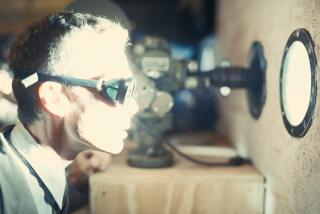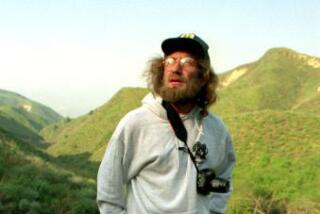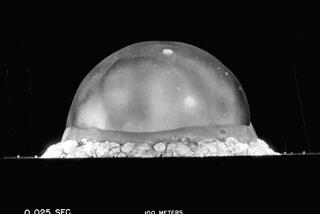Robert F. Christy dies at 96; Manhattan Project physicist
Robert F. Christy, a physicist who was a key member of the Manhattan Project team that created the atomic bomb during World War II, died Wednesday at his Pasadena home. He was 96.
Christy, who spent 40 years as a Caltech professor and administrator, died of natural causes, the university announced.
In 1943, he joined the hundreds of scientists working on the Manhattan Project in Los Alamos, N.M., to develop the nuclear bomb. He was hand-picked by project director J. Robert Oppenheimer, with whom Christy had studied quantum mechanics at UC Berkeley.
The Canadian native worked in the projectâs theoretical division to develop a trigger mechanism for the bomb sometimes called âthe Christy gadget.â
When the first bomb was tested at Los Alamos, everyone was pleased with the experimentâs success; but a month later, when the atomic bomb was dropped on Hiroshima in 1945, it was very sobering, according to Christy.
âWar is a very bloody thing,â he later said. âI felt then that although this was a terrible event, it probably saved many, many more Japanese lives. They probably would have lost millions if they had to defend themselves against an invasion.â
His wartime experience led him to oppose further development of nuclear weapons. In the 1980s, he was part of the National Research Councilâs committee on dosimetry, which traveled to Hiroshima and Nagasaki to study the effects of radiation from the bombs dropped on the Japanese cities.
After joining Caltech in 1946 to teach theoretical physics, Christy served as acting president of the university in 1977 and 1978, between the terms of Presidents Harold Brown and Marvin L. Goldberger. He was academic vice president and provost from 1970 to 1980 and took emeritus status in 1986.
At Caltech, Christy investigated pulsations in the brightness of stars, which are used to measure cosmic distances. He was awarded the Royal Astronomical Societyâs Eddington Medal for his work.
In a statement, B. Thomas Soifer, chairman of the universityâs division of physics, mathematics and astronomy, called Christy âa major figure at Caltech in the postwar eraâ and a founder of an important area of astrophysical research.
âHis contributions to scientific research, to public policy â and his leadership helped in shaping what Caltech is today,â Soifer said.
Robert Frederick Christy was born May 14, 1916, in Vancouver, Canada, and earned a bachelorâs degree in physics from the University of British Columbia at 19. He followed it with a masterâs from the school in 1937 and a doctorate in theoretical physics from UC Berkeley in 1941.
Christy taught at the Illinois Institute of Technology and did research at the University of Chicago under noted physicist Enrico Fermi before going to Los Alamos. While in New Mexico, he became a U.S. citizen.
He is survived by his wife, I. Juliana Christy-Sackmann, two sons, two daughters and five grandchildren.
More to Read
Start your day right
Sign up for Essential California for the L.A. Times biggest news, features and recommendations in your inbox six days a week.
You may occasionally receive promotional content from the Los Angeles Times.






